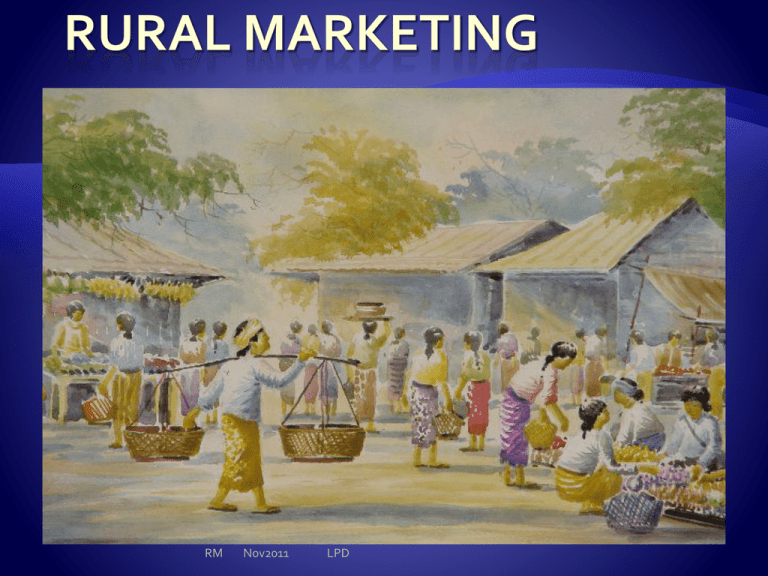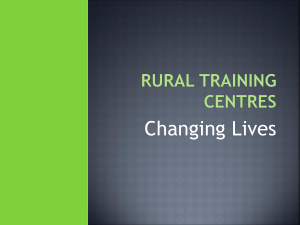RURAL MARKETING
advertisement

RM Nov2011 LPD Places away from towns or cities. “Group of people who are tradionalists in outlook, rooted in land and who resist change” RBI defines locations with populations up to 10000 as rural, 10,000to 1,00,000 as semi urban. As per sahara group locations having shops and commercial establishments up to 10,000 are treated a rural. LG Electronics defines rural and semi urban area as all other cities other than the seven metros.’ RM Nov2011 LPD What is Rural Government agencies like IRDA (Insurance Regulatory And Development Agency and NCAER (National Council for applied Economic Research) define Rural as villages with a population <5000 with 75% male population engaged In agriculture etc” Towns are actually rural areas but satisfy The following criteria Census RBI NABARD Sahara LG Elect. Minimum Population>=5000 75% of the mail population engaged in Non –agri activity Location with population up to 10000 Considered Rural Semi Urban 10000 to 100000 All locations upto a population of 10000 Will be considered Rural All locations having shops/establishments’ Upto 10000 (not population related) are Treated as Rural The rural and semi urban area is defined As all cities other than major metros Concept of Rural from the perspective of marketing has Indeed been dynamic.- gradually changed over the times Was not India a so called Village/Rural for the world a couple of decades back NABARD National Bank for Agriculture & Rural Dev It is a two way process, involving the marketing of agricultural products from rural areas to urban areas, and the marketing of agriculture inputs like fertilizers, pesticides, seeds machinery, consumables like tooth paste, soaps, cosmetics, food items etc and consumer durables like televisions, refrigerators, and services like postal, communications. Transport services etc from urban to rural areas. RM Nov2011 LPD The marketing battle has shifted from cities to the villages. “Go Rural” seems to be the latest slogan. Adi Godrej of Godrej soaps says “ The rural market is not sleeping any longer we are”. There are 42,000 rural super markets in India that exceed the total number of retail chain stores in the United States(35,000). In 2001-02, the life insurance Corporation sold 55% of its policiesRMin Nov2011 rural India. LPD Of the 20 lakh BSNL mobile phone connections, 50% are in small towns and villages. The billing per cell phone in small towns in Andhra Pradesh is higher than the billing in the capital , Hyderabad city. Of the 2 crore who have signed up for rediffmail, 60% are from small towns. RM Nov2011 LPD Internet access in semi urban and rural areas has increased through the “sanchar dhabas “ of BSNL, operating in 3617 out of 6332 blocks In the country. The 41 million kissan credit cards issued in rural India exceed the 40 million credit plus debit card issued in urban India. RM Nov2011 LPD . Urban population is concentrated in about 3,200 cities and towns, the rural population is scattered across5,75,000 villages. Heterogeneity is the hall mark of rural market.About 5,75,000 villages, 6 religions, 33 languages and many diverse cultures characterize our rural markets. RM Nov2011 LPD The rural market in India is seasonal and irregular. Dominance of agriculture income , greater influence of marriages and festivals on the pattern of income are the main reasons for the seasonal character of the rural markets. Consists of more than 750 million consumers RM Nov2011 LPD All rural consumers do not share a common buying behavior. Poor and weak infrastructure. There is low exposure to market stimuli in rural areas. Rural consumers buy on small quantities on account of low per capita income and limited storage capacity. Rural consumers are tradition bound. RM Nov2011 LPD Rural consumers resist change, urban consumers are ready to adopt changes. Poor and weak infrastructure in rural areas, well developed. Marketing activates are widely scattered in rural markets, and concentrated in urban markets. . RM Nov2011 LPD Rural markets are untapped ,urban markets are saturated RM Nov2011 LPD ECONOMIC ENVIRONMENT SOCIAL AND CULTURAL ENVIRONMENT POLITICAL ENVIRONMENT DEMOGRAPHIC ENVIRONMENT TECHNOLOGICAL ENVIRONMENT RM Nov2011 LPD RM Nov2011 LPD





